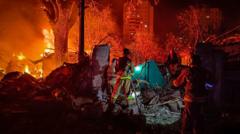A drone attack alleged by Moscow to be from Ukraine has ignited a major fire at an oil depot near Sochi, affecting air travel and escalating tensions further.
Ukraine Drone Strike Ignites Fire at Sochi Oil Facility

Ukraine Drone Strike Ignites Fire at Sochi Oil Facility
A Ukrainian drone strike is reported to have caused a significant fire at an oil depot in Sochi, Russia, exemplifying the ongoing conflict between the two nations.
In the latest developments of the ongoing conflict, a drone attack attributed to Ukraine caused a massive fire at an oil depot located near Sochi, a popular resort on the Black Sea. The blaze, which was eventually extinguished, reported debris from the drone hit a fuel tank, prompting swift action from local firefighters. Sochi's Mayor, Andrei Proshunin, confirmed via social media that the fire was under control. The incident led to temporary flight suspensions at the nearby airport, a significant site since the 2014 Winter Olympic Games.
In retaliation, Russian forces bombed key infrastructure in Ukraine, including a bridge in the southern city of Kherson, resulting in the death of one individual and injuries to several others. Ukrainian sources reported additional casualties from ongoing strikes in the Kherson and Donetsk regions. During the weekend, Russian authorities claimed multiple drone attacks had been initiated against various infrastructure in central Russian cities like Ryazan, Penza, and Voronezh, where at least four people sustained injuries.
The ongoing conflict has seen a series of drone strikes from both sides, with Russia asserting that its air defenses intercepted dozens of Ukrainian drones over the Black Sea region. Recent weeks of heightened aggression have left civilians in particularly vulnerable situations, leading President Volodymyr Zelensky to urge the international community for tighter sanctions on Russia, while U.S. President Donald Trump has echoed similar sentiments regarding potential new sanctions.
As the conflict continues to escalate, the humanitarian toll remains severe, with Kherson's regional head calling for partial evacuation of affected areas due to renewed strikes. The violence has intensified after last week’s deadly wave of attacks on Ukraine's capital, Kyiv, which left at least 31 people dead, making it one of the bloodiest periods since the war's onset in February 2022. The international community keenly watches the situation as stakeholders react to the evolving dynamics of this critical conflict.
In retaliation, Russian forces bombed key infrastructure in Ukraine, including a bridge in the southern city of Kherson, resulting in the death of one individual and injuries to several others. Ukrainian sources reported additional casualties from ongoing strikes in the Kherson and Donetsk regions. During the weekend, Russian authorities claimed multiple drone attacks had been initiated against various infrastructure in central Russian cities like Ryazan, Penza, and Voronezh, where at least four people sustained injuries.
The ongoing conflict has seen a series of drone strikes from both sides, with Russia asserting that its air defenses intercepted dozens of Ukrainian drones over the Black Sea region. Recent weeks of heightened aggression have left civilians in particularly vulnerable situations, leading President Volodymyr Zelensky to urge the international community for tighter sanctions on Russia, while U.S. President Donald Trump has echoed similar sentiments regarding potential new sanctions.
As the conflict continues to escalate, the humanitarian toll remains severe, with Kherson's regional head calling for partial evacuation of affected areas due to renewed strikes. The violence has intensified after last week’s deadly wave of attacks on Ukraine's capital, Kyiv, which left at least 31 people dead, making it one of the bloodiest periods since the war's onset in February 2022. The international community keenly watches the situation as stakeholders react to the evolving dynamics of this critical conflict.




















